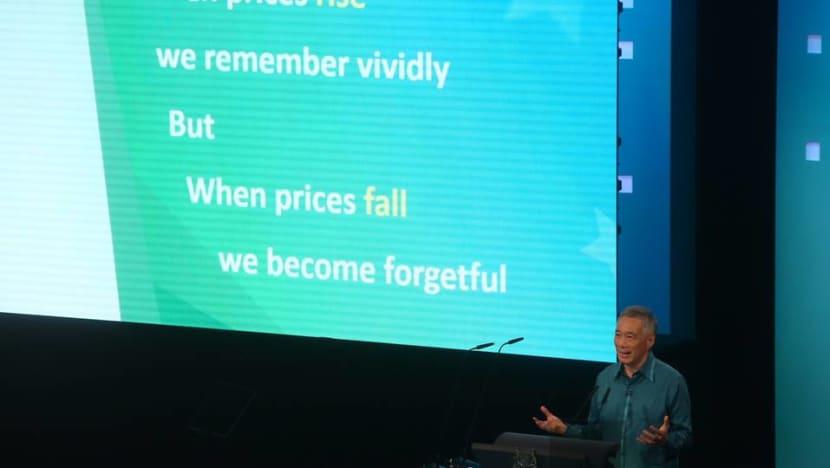NDR 2018: Government will do its part to alleviate concerns about cost of living, says PM Lee
But Mr Lee stressed that Singaporeans also have a responsibility to manage their own expenses amid lifestyle changes that have contributed to higher living costs.

PM Lee Hsien Loong speaking at the 2018 National Day Rally (Photo: TODAY/Ooi Boon Keong)
SINGAPORE: With Singaporeans still feeling the squeeze from rising cost of living, the Government will do its part to help alleviate these worries, said Prime Minister Lee Hsien Loong on Sunday (Aug 19).
“People still feel cost of living pressures,” he said in his Chinese speech at the National Day Rally, where he highlighted four contributing factors to the worries about living costs despite Singapore seeing steady economic growth, low unemployment and higher wages.
“They sense that they have to spend more and that their earnings never seem to be quite enough.”
Mr Lee said the Government is looking at housing, education and healthcare costs “very closely” given that these major expenditure items are the top concerns among Singaporeans, especially young families and the sandwiched generation.
"We will make sure that HDB housing, healthcare and education are affordable so Singaporeans do not have to worry about them."
Meanwhile, price increases and an improved standard of living have also pushed up living costs.
Measures are in place to allay worries related to the rise in water and electricity prices, but Mr Lee said Singaporeans also have a responsibility to “look after (their) own wallets” amid lifestyle changes.
PRICE INCREASES
The rise in prices of goods and services here can be attributed to inflation, which has been “relatively modest” according to statistics, said Mr Lee.
Singapore has also done better than most developed countries in terms of overall wage gains though this has not occurred across the board.
“I know that not everyone’s wages grew,” said Mr Lee. “For some, their wages have stagnated. Others worry about losing their jobs because of economic restructuring. Some have lost their jobs but they are the minority fortunately.”
There are also retirees who no longer have incomes and are worried about their savings running out, he added.
“Therefore, for these Singaporeans, when prices increase ... they feel as if ‘their wallets have shrunk’.”
Mr Lee said the Government has tried to keep inflation low and prices stable, but it cannot completely prevent prices from increasing.
Water prices, for instance, have gone up for the first time in nearly 20 years following last year’s announcement of a 30 per cent hike that was implemented in two phases.
Mr Lee said the Government has put off the increase “for as long as (it) could” but it had to do it in the end given significant increases to the cost of producing clean water over the years, as well as the need to build more NEWater factories and desalination plants.
“Water will always be a precious resource for us, a strategic and security issue, as well as a sensitive foreign policy matter,” he said in his speech delivered at the Institute of Technical Education College Central in Ang Mo Kio.

Moving on to the recent increase in electricity prices, Mr Lee said electricity tariffs today are actually lower compared to 2008 as he showed a chart that plotted the fluctuations of tariffs over the past 10 years.
According to that chart, the electricity tariff stood at 25.07 cents per kilowatt hour (kWh) in the third quarter of 2008. Since then, it has gone up and down over the years and is now at 23.65 cents per kWh.
“Unfortunately, we all remember vividly when the electricity tariff goes up but when the tariff comes down, we forget quickly.”
With Singapore importing almost all of its energy, it cannot control electricity tariffs that track changes in global oil prices, said Mr Lee.
On why the Government does not fix electricity tariffs, the prime minister explained that doing so will involve costly subsidies as Singapore is not an oil producing country.
“This is not financially sustainable in the long run,” he said.
In addition, having such a policy will mean that those who consume more electricity will receive more subsidies.
With the well-to-do more likely to have higher consumption, subsiding the cost of electricity by fixing a low tariff is not the best way to help low-income families, Mr Lee said.
The more effective way is to give direct subsidies to low-to-middle income families for their utilities bills, such as the U-Save rebates for all households living in HDB flats.
"I hope people will understand that we have adopted the best approach to lessen the burden of Singaporeans," he added.
HIGHER SPENDING WITH LIFESTYLE CHANGES
Lifestyle changes alongside economic growth and technological progress have also contributed to higher cost of living, said Mr Lee.
Items that were once considered luxury items or did not exist before, such as air conditioners and smartphones, have now become daily necessities. People are also eating out more, while enjoying more entertainment and leisure options, he said.
"Our standard of living have gone up. That is a good thing because it means that our lives have improved.
"However to sustain this higher quality of life, people are spending more than before and that can put pressure on them," said Mr Lee.
Handphones, for one, have completely changed lifestyles and how people communicate.
With households doing away with landlines and every family member using a handphone, telecommunication bills have increased, with some low-income families having bills as much as S$300.
This accounts for more than 10 per cent of their household incomes, said Mr Lee.
This compared to how telecommunications bill was about S$8 a month or S$100 a year in the 1990s, he added.
Mr Lee also touched on how many young parents are concerned about the cost of infant milk formula in Singapore.
For that, the Government has since set up a task force led by Senior Minister of State of Trade and Industry Koh Poh Koon.
The task force has attempted to tackle the issue in various ways, such as simplifying import processes, as well as bringing in more brands and parallel imports.
Public hospitals have also begun offering more affordable brands, with private hospitals also coming on board.
The Government has also indicated clearly that it will tighten regulations for the labelling of infant formula and put a stop to misleading advertising.
Amid these initiatives, Mr Lee said the average price of formula milk has dropped.
"Through these efforts, there are now more reasonably priced options for consumers to choose from," he said.
"More importantly, young parents are better informed. They are now able to make better choices, based on their needs and budget."
Lastly, Mr Lee turned to how fewer families cook at home these days and are eating out more, given that it is more convenient especially for dual-income families.
While this lifestyle change in completely understandable, he said it pushes up the cost of living.
The Government will help Singaporeans manage the cost of eating out by building more hawker centres. Seven new centres have been built in the last few years and 13 more are on the way, he said.
“Stalls in the new hawker centres are required to provide affordable food choices. Almost every stall will offer at least one economical meal option, priced at S$3 or less.
“In other words when we tender out the hawker centres, we do not assess bids just on their tender price alone but also whether the operators can offer affordable options," said Mr Lee.
But while the Government will do its part to alleviate concerns that people have about cost of living, Mr Lee said that Singaporeans also have a responsibility to look after their own wallets.
“Each of us has a responsibility to ‘look after our own wallets’ – save water, save electricity, and at the same time, shop around for the best prices and be a smart consumer,” he said.












